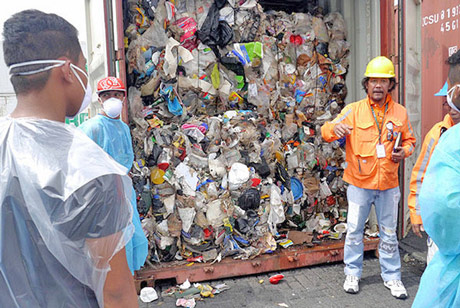In the News
ire in Philippines

Environmental groups in the Philippines have renewed their demands that Canada takes back shipments of illegal trash that it illegally sent to the Southeast Asian nation five years ago.
The renewed calls come after South Korea, recently agreed to take back around 6,500 tons of garbage illegally shipped to the Philippine island of Mindanao last year.
Unlike South Korea, Canada has refused to take responsibility for the waste it brought to the Philippines, said Antonio La Viña, former dean of the Ateneo School of Government and also an ex-environment undersecretary.
“It's really accepting responsibility. There's nothing else except that," he told ABS-CBN News, saying the only move left for the Philippines would be to wait and to continue talking with Canada.
A total of 103 containers of Canadian waste, consisting of household trash, plastic bottles and bags, newspapers, and used adult diapers, arrived in Manila in batches from 2013 to 2014. Trash from at least 26 containers (out of the 103) have already been buried in a Tarlac landfill.
The garbage was wrongly declared as plastic scraps.
The international convention, to which both Canada and the Philippines are signatories, provides that “the exporting country must take back the waste materials if the receiving country refuses to accept them.” But Canadian officials earlier said there was no violation of the Basel Convention as the shipment did not contain hazardous waste.
In 2016, a Manila court ordered the importers to take the waste back to Canada but the garbage heaps continue to rot in the country's ports nearly 3 years after, leading green group EcoWaste Coalition to question the government's current efforts.
"What happened to the ruling? How long do we need to wait?" said Aileen Lucero, national coordinator of EcoWaste Coalition, a group that since 2013 has repeatedly urged Canada to take back its waste.
In a press conference on the sidelines of the Association of Southeast Asian Nations Summit in November 2017, Canadian Prime Minister Justin Trudeau said he and President Rodrigo Duterte touched on the topic during informal talks.
"We also discussed the garbage issue which has been a long-standing irritant and I committed to him as I am happy to commit to you all now that Canada is very much engaged in finding a solution on that," he said.
Trudeau said the Canadian government worked around its laws so it can take back the garbage shipment, adding that it had been barred by its rules.
"Canadian legal regulations prevented us from being able to receive the waste back to Canada. We had legal barriers and restrictions that prevented us from taking it back, but that's done now," Trudeau said.
There were still questions being discussed, he said at that time, such as "who will pay for it, where the financial responsibility is."
A Department of Environment and Natural Resources (DENR) official told ABS-CBN News it was doing its best to ship the waste from Canada out of the country soon, as Philippine and Canadian officials have been coordinating on the matter.
Benny Antiporda, DENR undersecretary for solid waste management said the Korean case is different from the Canadian private firm's garbage shipment, which was misdeclared as plastic scraps.
"They are two separate issues, this is not the same incident as the Canada waste. The Canada waste, the principal just ran away and the Filipino principal was left and they had no money to pay for the shipment of the said waste going back to Canada. But the Canadian government was cooperating. But the problem there is it's still an existing case so we cannot even touch the evidence," he said last November.
"This Korean waste is another issue, wherein the proponents are cooperating. We just hope that they won’t turn their back on us because really the full force of the law will be implemented against them."
As of November 13, 2018, the estimated cost for storing the garbage shipments from Canada at the Subic Container Terminal had already reached around P34 million, according to the Bureau of Customs bureau, while the one in a Manila port reached some P2 million.
As the Canadian trash stays in the country's ports, at least 1,400 tons of garbage have begun the trip back to South Korea while around 5,100 tons more have been packed and readied for their turn, according to the DENR.
The recent toxic discoveries, represents the third time in recent years that the Philippines has been revealed as a dumping ground for hazardous foreign trash. South Korea, one of Manila’s strongest allies and top investors, has been the culprit on two occasions.
Greenpeace Philippines campaigner Abigail Aguilar said in a statement, “While the Philippines itself is reeling from the amount of plastic waste we are generating, it is distressing that other countries are still looking at us to dispose of their wastes,” she added.
The nation’s garbage woes are particularly evident in Metro Manila, a megacity of over 12 million. The city is inundated in single-use consumer plastic product wrappers for shampoo, soap, tooth paste and cooking oil due to their affordability.
Research shows that the Philippines is the third worst plastic polluter of oceans in the world, trailing only China and Indonesia, according to the Ocean Conservancy, a non-profit environmental advocacy group based in Washington.
Regional neighbors Thailand, Vietnam and Malaysia were also included on the world’s worst plastic polluters list.
Aileen Lucero, national coordinator of the EcoWaste Coalition, criticized the Philippine government for accepting foreign hazardous waste when it cannot manage its domestic garbage problem.
“Why do we keep on accepting garbage from other countries when we know that our country’s plastic waste, which is literally everywhere, is spilling to the oceans and endangering marine life?” Lucero said.
To advertise in ICW call
Call 905-738-5005